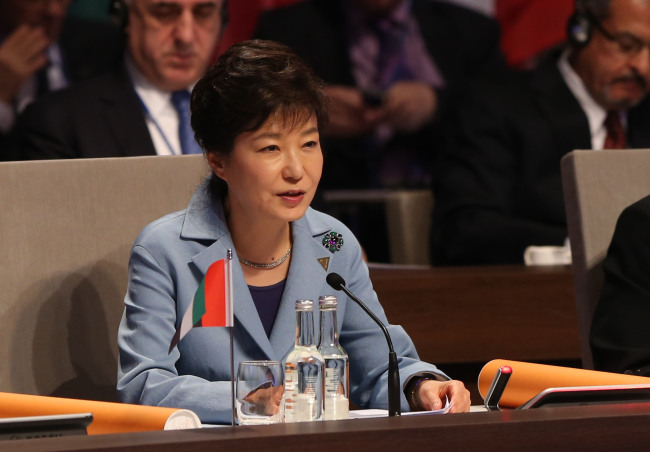Obama, Xi differ over resuming six-party talks
Park, Obama, Abe call for unity to end N.K. nuclear programs
By Korea HeraldPublished : March 25, 2014 - 21:19
The leaders of the U.S. and China on Monday differed over the resumption of the long-stalled multilateral talks on North Korea’s denuclearization despite their shared opposition to Pyongyang’s possession of nuclear arms.
During their meeting on the sidelines of the Nuclear Security Summit in The Hague, Netherlands, U.S. President Barack Obama remained cautious about reopening the talks when Pyongyang shows no willingness to abandon its nuclear programs.
Chinese President Xi Jinping expressed hope that the aid-for-denuclearization talks could resume at an early date. The so-called six-party talks, which involve the two Koreas, the U.S., China, Japan and Russia, have not been held since December 2008.
The talks between Obama and Xi came before South Korean President Park Geun-hye, Obama and Japanese Prime Minister Shinzo Abe held a three-way summit on the same day to discuss the North Korean nuclear standoff.
“Any discussions or dialogue among the six parties around the situation in North Korea needs to be based upon actions taken by North Korea, which has not yet demonstrated its willingness to come to the table seriously,” Ben Rhodes, deputy U.S. national security adviser, told reporters after the bilateral summit.
During their meeting on the sidelines of the Nuclear Security Summit in The Hague, Netherlands, U.S. President Barack Obama remained cautious about reopening the talks when Pyongyang shows no willingness to abandon its nuclear programs.
Chinese President Xi Jinping expressed hope that the aid-for-denuclearization talks could resume at an early date. The so-called six-party talks, which involve the two Koreas, the U.S., China, Japan and Russia, have not been held since December 2008.
The talks between Obama and Xi came before South Korean President Park Geun-hye, Obama and Japanese Prime Minister Shinzo Abe held a three-way summit on the same day to discuss the North Korean nuclear standoff.
“Any discussions or dialogue among the six parties around the situation in North Korea needs to be based upon actions taken by North Korea, which has not yet demonstrated its willingness to come to the table seriously,” Ben Rhodes, deputy U.S. national security adviser, told reporters after the bilateral summit.

Obama also stressed the need for close coordination in sending a clear message that there should be denuclearization on the Korean Peninsula, according to the White House official.
Rhodes also told reporters that Obama spoke of the need for the two global leaders to continue to insist that Pyongyang abide by its obligations and change its course toward nuclear armament.
During his talks with President Park on Sunday, Xi said that Beijing had been trying to persuade Pyongyang to come to the negotiating table and guide it in the way the international community wants it to go.
Apart from the North Korea issue, the two leaders also discussed ways to promote mutual cooperation over various bilateral and global issues including climate change and developments on the Crimean Peninsula.
“I think it is fair to say that this bilateral relationship has been as important as any bilateral relationship in the world, and we’ve made great strides,” said Obama before the summit began.
“I believe ultimately that by working together, that China and the U.S. can help to strengthen international law, respect for the sovereignty of nations, and establish the kinds of rules internationally that allow all people to thrive.”
Xi, in return, said that China was committed to its position of “no confrontation, no conflict, mutual respect, and win-win cooperation” with the U.S.
“We will adopt a more positive attitude and more vigorous actions to strengthen cooperation with the U.S., and also to effectively manage our differences and sensitivities and make sure the China-U.S. relationship will continue to move forward in a healthy and steady fashion,” said Xi.
Later in the day, the leaders of South Korea, the U.S. and Japan were to discuss their joint cooperation in handling North Korea’s nuclear and missile threats.
For Park and Abe, the three-way meeting was their first official summit. Park had turned down Abe’s repeated calls for a bilateral summit amid escalating territorial and historical feuds.
Meanwhile, President Park stressed on Monday that the vision of a nuclear-free world should first be realized on the Korean Peninsula.
“I have this belief that addressing the North Korean nuclear problem is definitely necessary to make the world free from nuclear arms, and thus the vision of a nuclear-free world should first begin from the Korean Peninsula,” Park said during her keynote speech at the opening ceremony of the nuclear forum.
“Pyongyang’s nuclear program is a subject of grave concern in terms of nuclear proliferation, nuclear security and nuclear safety. Therefore, it should be definitely dismantled for world peace and security.”
During her speech, she also made a set of proposals to help foster the nuclear security mechanism to handle nuclear terrorism. The proposals include seeking a regional cooperative mechanism for nuclear security; reducing gaps in nuclear security capabilities among nations; and drawing up measures against cyber terrorism on nuclear facilities.
By Song Sang-ho (sshluck@heraldcorp.com)
-
Articles by Korea Herald





![[Herald Interview] 'Amid aging population, Korea to invite more young professionals from overseas'](http://res.heraldm.com/phpwas/restmb_idxmake.php?idx=644&simg=/content/image/2024/04/24/20240424050844_0.jpg&u=20240424200058)












![[KH Explains] Korean shipbuilding stocks rally: Real growth or bubble?](http://res.heraldm.com/phpwas/restmb_idxmake.php?idx=652&simg=/content/image/2024/04/25/20240425050656_0.jpg&u=)

